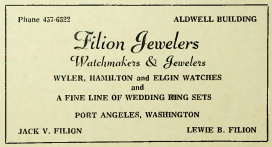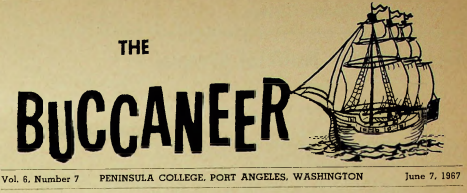
College to graduate 80 Saturday
On June 10, between 4 and 5 p.m. Peninsula College will graduate approximately 80 men and women during the filth gradnation ceremony since the school began. For the first time, in a
ceremony that is open to all the public, the nursing students will
graduate with the rest of the class even though they have several
weeks of school remaining.
Mr. John D. Glann, superintendent of Port Angeles schools
1945 to 1965, who proved instrumental in the realization of this
institution, will deliver the main address, titled “The World of the
Future.” The Rev. Robert Rings of the First Methodist Church will
deliver the invocation and benediction. The diplomas will be
awarded by Peninsula College President, E. John Maier. Three
special awards will be received by members of the sophomore
class, according to Miss Rosemary Gala, chairman of the graduating program. The first two awards will go to the outstanding man
and woman attending this school. The selection of these students
is made by the faculty who make the choice according to scholarship as well as service to the school. The names of the students
will be engraved in a plaque placed in the trophy window in the
Pirate Union Building.
The other award is the Elsie Ware Meyer scholarship award
of $500. It will go to a graduating student who expresses a need
and desire to continue his or her education. “Outstanding scholarship is also a factor,” stated Gala. The scholarship can be used
at any school desired by the student.
For the first time, graduation will take place in the gymnasium.
This will mean that the public is invited to attend. For the past
two years it has been held in the little theatre and before that
ceremonies were held al the high school.
There will be a short reception in the Pirate Union Building
following commencement exercises. Phi Theta Kappa will serve
refreshments while faculty, parents and students become acquainted with each other.
•The freshman class is working on the possibility of having a
party, open to the whole school, a short time after the reception.
Plans for this party are still on the drawing board.
A rehearsal the day before graduation will be held at 4 p.m.
New BOC Officers
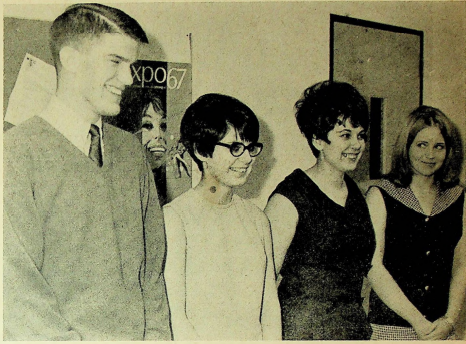
May 8-12. The winners are, from left, President John Morrish who replaces Steve Ohrman;
Vice-President LeAnn Berg, who replaces Claudette Reandeau; Secretary Arlene Tjemsland,
who replaces Linda Dryke; and Treasurer Marcia Winters, who replaces George Braly.
Faculty Speakers Group
The Community Service Committee of Peninsula College is
presenting the Faculty Speakers Bureau to the people of the
Northern Olympic Peninsula.
This service is being provided
by volunteers from the faculty.
Program chairmen of local organizations are welcome to
choose from a variety of speakers and subjects. As a community service, the Faculty
Speakers Bureau will provide a
program without charge except
for mileage on out-of-town engagements.
Speakers can be contacted
through Chairman Ray Duncan
at the college by phoning 452-9277It is hoped that all requests can be made at least two
weeks in advance.
Through this service, Peninsula College wishes to demonstrate its continuing desire to
serve as a community college.
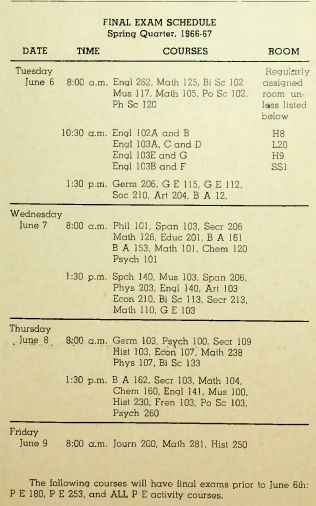
Publications and BOC Hold Joint Banquet
Peninsula College’s newspaper and annual staff combined
with the out-going and in-coming BOC officers in a joint banquet on Memorial Day evening
at Birneys Banquet Room.
The purpose of the affair
could probably best be exemplified in terms of the day the
banquet was held — remembrance. The newspaper and
annual editors, Robert Ludke
and Mary Pfaff, were introduced and thanked for their work
on their respective publications
for the past year.
All of the out-going Board of
Control officers, President Steve
Ohrman, Vice-President Claud
ette Reandeau, T reasurer
George Braly and Secretary
Dryke were applauded for the
work they have done for the
school during the past school
year.
BOC officers for the 1967-68
academic year were introduced
also. They are introduced and
identified in the picture just
above this story.
Publications Director David
Daheim introduced the publications people and presented them
to the gathering. President of
the BOC, Ohrman, introduced
the old and new officers, and
also the speaker of the evening,
Dean of Students, Arthur Feiro
who will be leaving for a one
year leave of absence for further research and study. He
thanked all present for their
contributions to the functioning
of Peninsula College for this
past year and wished the new
officers continued success in
the upcoming year.
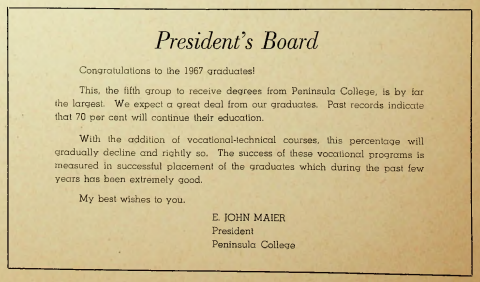
College Has Fine Six Year Record
The educational impact of
Peninsula College during the
first six years of its history has
been something of which citizens, students and faculty may
be justifiably proud. SevenPeninsula College graduates
are teaching in the Port Angeles
school system at present, with
many more located in other
communities. Peninsula College students have participated
in the work of various government agencies and private corporations, while others have
continued their education al
various professional schools. If
the past be any index of the future, Peninsula College will conchallenges of tomorrow.
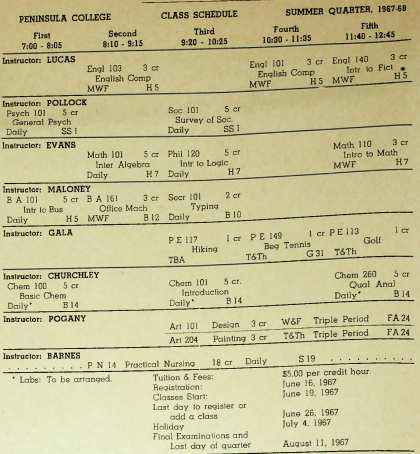

Hoffa & Our Judicial System
By BUTCH LUDKE
Recent editions of all daily newspapers have carried the account of the granting of a new hearing for Teamster President
Jimmy Hoffa on his 1964 mail fraud conviction. The question is:
Is this an example of our judicial system in action trying to equate
true justice for all concerned, or, is it yet another example of the
influence that money has in each and every aspect of our society?
One of the five truths that the Declaration of Independence
deems ”self-evident” is that ‘all men are equal.” This has the
connotation that all men should be afforded equal protection of
the law. Without a great deal of research, you can find that the
theory of equal protection of the law and equal treatment in our
courts is much different than the actual practice thereof.
Money talks. As much as some of our ideals and theories
deny, money talks in our courts, too. As a means of contrast, examine and analyze a fairly recent Supreme Court decision whicn
gives defense to the indigent appearing in our courts on the one
hand, and on the other hand consider the court freedoms granted
the rich—i.e. Jimmy Hoffa
COURT TREATMENT FOR THE INDIGENT:
A pamphlet printed and circulated by the National Municipal
League in 1966 contained the following information: “On March
18, 1963, the Supreme Court handed down a historic decision:
Every state ‘must” provide counsel to indigent prisoners in felony
and serious misdemeanor cases.”
“Without the help of a lawyer,” U. S. Supreme Court Justice
William J. Brennan was quoted in the release, “all lh^ other safeguards of a fair trial may be empty.”
The Supreme Court decision in 1963 had enormous reverberations. To give you some kind of an idea of what court treatment
had been alotted the indigent up until that time, in Florida alone,
more than 1,100 prison inmates have since had a retrial with counsel and have been found innocent and released. And Florida, up
until July, 1963, was only one of 15 states that did not have a provision for counsel for indigent prisoners.
All states now have a system of assigning counsel by the
court for an indigent defendant. Does this solve the problem of
equality in the courts for the poor? Not quite. The Harvard Law
Review of 1966 points up the various shortcomings in the system
which improve court treatment for- the poor only slightly.
“Supreme Court Justice Tom Clark has characterized this system of court- appointment of attorneys as archaic, slip-shod, and
ineffective.” Assigning counsel to an indigent defendant can often
result in a situation as bad as if he had no counsel at all. Chief
Judge J. Edward Lumbard of the U. S. Court of Appeals for the
Second Circuit in New York kCity, explains: “The judge usually
picks some lawyer who happens to be in the courtroom—usually
a youngster just admitted to practice. After a few minutes of conference, the indigent defendant is advised to plead guilty, and he
feels he has no choice but to do so. Everyone who participates
in these proceedings knows that they are nothing more than a
farce.”
Even when a more experienced lawyer is chosen, the results
are often not encouraging. Theodore Voorhees, a Philadelphia
attorney, says that “the attorney, believing that the donation of his
time is sufficient contribution on his part, is unwilling or unable
to put up the funds for an investigation or expert witness. The
lawyer who must sacrifice lime and money if he appears at trial
has an interest in encouraging a guilty plea in order to conclude
the case rapidly.”
COURT TREATMENT FOR THE RICH:
Early in 1965, Jimmy Hoffa came to trial in Chatanooga,
Tennessee, on charges of conspiring to fix a federal jury. Hoffa
had an army of 29 lawyers. He employed the 29 lawyers in four
lines of defense. At the defense table sat Hoffa and nine trial
lawyers, making notes of possible reversible errors, checking
transcripts of testimony.
Meanwhile back in Hoffa’s hotel, another group pored over
testimony of the previous day, preparing questions for the examination of witnesses, drawing up affidavits, motions and other
pleadings. In a nearby library still other lawyers checked precedents and hunted up points of law. The jury still could not be
persuaded that black was white and Hoffa was sentenced to eight
years and a $10,000 fine.
Six weeks later, Hoffa went to trial again, and this time for a
federal mail fraud conviction. He drew a five-year term. He currently is serving both the eight-year and the five-year terms in the
Lewisburg, Pennsylvania, Penitentiary.
Hoffa has been on trial for various offenses on several occasions before. In 1957 he was tried on charges of having bribed a
Senate investigator. He was acquitted. Soon after, Hoffa was
tried again, this time on wire-tapping charges. The jury couldn’t
agree, and Hoffa had the last laugh again. So does his recent
convictions indicate that true justice is finally being met? Again,
not quite. Lawyers for Hoffa are still poring over both of his convictions. A jury sentenced him to five years in jail for the mail
fraud rap. If you don’t think money talks in our courts, you didn’t
see the newspaper headlines last week: HOFFA GRANTED NEW
HEARING.
Ode, Farewell, And Adios PC
By ROBERT LUDKE
Having now completed my
fourth straight year of working on the editorial staff of a
student newspaper, I have some
comments to everyone in general but to the freshman class
in particular concerning some
of the rigors and responsibilities of a student publication.
Outside of the student government body, in our case the
BOC, the only source for publishing or letting “your” opinions and attitudes be known is
the student newspaper. It would
seem as though there ought to
be a line of people waiting to
be accepted on a newspaper
staff, especially on a college
publication. There is no line
here, there are very few volunteers, and thus we have to recruit.
The future of the Buccaneer
for next year rests with this
year’s freshman class. If what
they’ve done to contribute to
its success so far is any indication, the publication may well
cease next year.. Freshmen
have not submitted any lettersto-the-editor; very few freshmen
signed up for the activity and
those that did fell away. Now,
at the conclusion of the year,
we have zero (0) freshmen working on the staff and the next
editor has yet to be selected
because there are no freshmen
enthusiastic enough to volunteer any ability they may have
towards this means.
If you want to have your
newspaper “die,” that’s up to
you. I won’t be here to see it
and I’m glad. Something as
important as reporting the news
of the school’s activities, giving
publicity where publicity is due,
writing editorials which may
prove effective in constituting
change, entertaining, and informing is too much valued
from this corner to let it be discontinued because of apparent
apathy.
Now at the conclusion of
the year, we have zero (0)
freshmen working on the staff
and the next editor has yet to
be selected because there are no
freshmen enthusiastic enough
to volunteer any ability they
have toward this means.”
Graduating Class Lists 80
At 4 p.m. on Saturday, June
10, Peninsula College will hold
its fifth annual graduation exercises. The college will graduate approximately 80 students
with the two degrees that it has
in the 1967 commencement program.
Following is the list of graduating students with the degree
that they have earned while attending Peninsula College.
ASSOCIATE OF ARTS:
Rene Adams, Brian Anholt,
Keith Bean, Steven Bennett,
Robert Bernard, Christine Billings, Robert Bieck, Barbara
Bond;
George Braly, Michael Brisbin, Ronald Brown, Darwin Bullock, Ronald Carr, Larry Carson, Gary Childers, Mae Clary;
‘ Raymond Connors, Russell
Dalton, Linda Dryke, Kathleen
Duncan, Douglas Dysart, Sharon Dysart, Kenneth Geirer;
Barbara Hawks, Judith Hoff
man, Richard Hopman, LaVine
Hubert, Kenneth Hulett, Conrad
Johnson, Karen Kettel;
Cynthia Lake, Kenneth Landry, Barbara Majeski, Judy McGuire, Matthew Meeker, Dale
Mennie, Gerald Moe, John
Moore;
Robert Neal, Dan Newman,
Cecelia Nite, Joyce Odell, Steven Ohrman, Kent Osborne, Lorraine Peters, Mary Pfaff, Claudette Reandeau;
Linda Reidel, Larry Rings,
Richard Rose, Shirli Rowe, Robert Ruud, Mark Schnabel, Barbara Scott, Ralph Sievers, Dufferin Simpson;
Kathleen Skerbeck, Beverly
Smith, David Smith, Sharon
Smith, John Spade, Phillip Spiegel, Jereta Sprague;
Daniel Swanson, Nancy Taylor, Phillip Ward, Brian White,
Donald Williams, and Brian
Zacharias.
ASSOCIATE OF APPLIED ART:
Roberta Avery, Randolph Barrett, Laurence Becker, John Busenbark, Kay Dorr, Betty Elder,
Jacqueline Griffith, Warren
Grondahl, Robert Hamblin, Patricia Hansen, Gerald Hause,
Susan Hendricks, Richard Hopman, Conrad Johnson, Joseph
Keeler, Robert Ludke, Michael
Leboki, Daniel Lupson, Michael
OLeary, Wendy Paul, JoAnne
Perry, and Bronnie Smith.


Sports-Scope
By BUTCH LUDKE
Progress for the National League’s New York Mets on a wonlost basis has been marked with a definite limitation since their
entrance into the league in 1963, but you wouldn’t know it by
looking at the New York Met fans.
As an indication of their stagnation in regard to baseball
success, the Mets had al this time last year won 11 games, lost 22,
for a winning percentage of .333 and were 12 games back of the
leader, the San Francisco Giants. So far this year, the Mets have
been winners in 11 games, losers in 22, for a winning percentage
of .333 and are 11 1/2 games back of the leader, the Cincinnati Reds.
Attendance at Met home games, however, has continually
been marked with definite expansion. Last year al this time, the
Mets had drawn 213,145 fans for their first ten home games. This
year after ten home games, the Mets have drawn 244,419 which
puts them second in the league in home attendance average,
placing only behind the Los Angeles Dodgers.
Attendance Theory
This brings up an interesting sports question: Why do baseball fans attend games? Is it simply to root for the home team or
is it to attend the games with full expectations of watching the
home team win? The former explanation seem to be the more
valid when one glances at this years National League standings.
The Dodgers, currently eighth, have drawn over 320,000 in
their 11 home games. The Mets, currently ninth and going down,
have drawn almost 250,000 fans. The league-leading Reds, on the
basis of average home attendance, are ninth in the league, exactly
the position filled by the Mets in the won-lost column.
The Mets are presently battling the Houston Astros for sole
possession of last place in the ten-team league, but that hardly
comes as a surprise. The two expansion teams started out in the
National League with a collection of cast-offs and rookies and
could hardly be expected to challenge for the pennant at least
for another five years. While neither team has a strong minor
league affiliation, they must rely on the rookies they can sign to
contracts and hope that they can make some good winter trades
to stay above water.
Mets’ Fans Theory
The Mets’ collection of rookies and veterans has resulted in
an interesting and exciting combination that brings the fans out.
Supporters of the Mets feel as though every win were an upset of
sorts and they pack Shea Stadium for each home game with this
expectation.
On the other hand, even when the Mets are going very badly
the attendance at home games is stable and often times even
increases. The fans give every error and every strike-out a cheer,
and once when rookie shortstop Bud Herrelson made his third
error of an inning, they gave him a standing ovation when he
caught a routine pop-up. Notoriously poor hitting pitcher Bob
Shaw once was relegated the same majestic treatment when he
grounded a ball back to the opposing pitcher.
Rabid does not adequately describe the Mets’ fans. They boo
the announcing of the opposing team’s starling line-up when it
comes over the public address. Opposing home-runs, of which
there are many, are met witth dead-pan silence. Opposing team s
errors are met with rousing cheers. The fans at Shea Stadium
don’t watch the game, they participate in it.
It is hard to imagine the Mets ever being a winning baseball
team in the National League with the system of player-draft they
have If this highly unlikely situation should ever arise one of
theso years, however, it would be interesting to note the effect it
would have on their home attendance. Many observers feel as
though there would be no observable change at all.
The fans at Shea are not as obsessed with winning as the
other home town fans seem to be. They come out to the park to
have fun, drink beer, and root for the Mets. If they wm, that s
great If they lose, that’s really alright too. The Met ans, of
which there are many, many legions, wish to watch the ball game
and enjoy themselves. Winning or losing the games seems to be
only a necessary consequence of the activity. Whose to say he
fans in New York really haven’t got the right approach to the
situation?
Pirate Baseballers Set New Mark
By DON FREY
Baseball season has been over for the Peninsula College Pirates for almost three weeks.
Of major note concerning the
season is the fact that the black
and gold set an all time high
for Peninsula College in the
number of games won—five.
Of major note concerning
those games is the fact that
Butch Ludke, one of the two
pitchers, hurled a no-hit game
aginst the local high school
team and also a four-hit shutout job on the Lower Columbia
Red Devils. Clark Babbitt, the
other Pirate hurler, picked up
wins over the high school and
Grays Harbor. Ludke accounted for the fifth win by defeating the high school in their third
contest of the year.
Over the whole season, the
Pirates beat the high school
three times, and then Lower
Columbia and Grays Harbor.
They lost to Olympic (third in
state), Clark (second in state),
and Centralia twice- Lower Columbia three times; and Grays
Harbor once.
“Considering the weather and
the number of people we lost,
(Ron Bidleman, Ed Bedford, Greg
Mason, Tom Lyons, Bill Thompson) I felt that the kids did very
well,” commented head mentor, Don Knowles. “I don’t want
to make excuses but we didn’t
have a field to practice on either. We had to work our schedule around the high school’s,
little league, city league, and
other groups using the only
available fields in town,” the
coach continued.
“I think some of the players
did exceptionally well. Ludke,
Darwin Bullock, Paul Richmond,
Steve Bennett, Scott Swisher,
Bob Rudd, Al Stautz, Jerry Moe,
and Babbitt all came on strong
toward the end of the season.
The rest of the players all did
a good job, too.
Letters were awarded to most
of the freshmen players who
finished the season. Jerry Moe,
a sophomore, was also awarded a letter.
The coach, who is leaving
this year to take over the job of
head basketball coach at Highline next year, continued with
some comments about Peninsula College.
“Peninsula is a closely knit
school. I have been impressed
with the attitude of the students.
They tend to be conservative
which I like in a person or a
group of people. I’ve had a
very enjoyable year. This has
been my first year teaching on
the college level and right now
I wouldn’t go back to high,” ‘he
added.
I ve felt that the weather was
a big drawback for the development of sports in this area. I
also wish and think that this
school needs another instructor
in the activities department and
someone to serve as an assistand coach, but I realize that
this is a long way off,” Coach
Knowles continued.
“As far as having a championship team, I feel this school
will be a contender. You must
realize that it takes several
years to build a winning team.
You have to have the money
to offer what the student wants
academically.”
As far as Jack Estes (new
head coach here next year) is
concerned, he may be able to
surpass Knowles’ win-lose record if he can come up with
some player talent. He may
even be more popular with the
public if he can accomplish
this difficult task. But he will
have one heck of a job surpassing the present coach as
an individual who has worked
hard to develop the athletic program at Peninsula College.
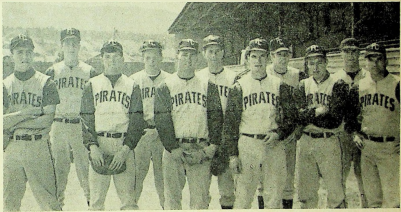
new school record for recording five baseball victories during
the course of the season. From left, Clark Babbitt, Al Stautz,
Paul Richmond, Dave Traband, Jerry Moe, Bob Ruud, Darwin
Bullock, Steve Bennett, Butch Ludke, Scott Swisher, and coach
Don Knowles.
Yakima JC Wins Tourney
The Yakima Junior College
Indians, behind the three-hit
pitching of Quincy southpaw
Mike Flanagan, defeated the
Clark College Penquins 7-0 in
the finals to give Yakima the
1966-67 State Junior College
baseball championship.
Flanagan was called to duty
after the Indians had lost to
the Penquins 7-4 in the preceding game, setting up the final
game. Earlier in the tournament he had responded with
a 3-0 whitewash of the Shoreline nine to advance Yakima
into the winner’s bracket with Clark.




Feiro Granted One-Year Leave for Advanced Study

Peninsula College Dean of
Students Arthur D. Feiro has secured a one year leave of absence from the college so that
he may continue his education
with three quarters of research
and study at Washington State
University in Pullman.
Feiro will leave for Pullman
on June 19 with his wife and
two sons and their plans are
now to return to Port Angeles
and Peninsula College the following June.
Speaking from behind his
desk in the Dean of Students
office where he has spent so
much of his time in the last
three years, Feiro reflected upon his stay at Peninsula, some
of the additional work he has
done in past summers, and
some of his plans for the future.
Feiro, who started at Peninsula when the school opened in
1961 as a biology and zoology
instructor, spent one year at
Harvard in research and study
in 1964, and returned to Peninsula as a teacher, Dean of Students and Athletic Director in
1965, said his year at Washington State would be spent in
continuing his work in higher
education and doing further
research and study in biology.
In reference to all of his summer and other additional study,
Feiro said, “Constant renovation is needed to keep the biology and zoology courses up to
date. The information that I
receive during the course of my
additional studies is brought
back to Peninsula College and
passed along to the students.”
He feels as though the biology
and zoology departments are
improving all the time. “The
improvements in the library
have helped our program here,
the increased use and increased
availability of audio-visual materials has aided, and the addition of a second biology teacher, Mr. Ed Tisch, has given the
students two points of view to
choose from,” he said.
The setting of Port Angeles is
an ideal spot for the study of
biology and zoology, according
to Feiro, and with additional
grants and new equipment, he
feels-that the department can’t
help but improve in the coming
years.
“The entire experience of
working in Port Angeles and at
Peninsula College has been a
delightful experience,” he says.
“The ‘family-type’ environment
found here enables the faculty
to really get the feeling of being associated with and knowing the student body.”
“We’ve been fortunate at Peninsula College,” Feiro said.
“The students that have come
here have really been remarkable. Most important, though,
they have really been a group
of ‘good kids’.”
When Feiro and his family
return from Pullman in June of
1968, he will continue his responsibilities of teacher, Athletic Director, and Dean of Students with a great deal of information that has been just
been discovered or tested during the past year or two. The
additional material he will bring
back, he feels, will make “the
entire delightful experience in
the past even more so even in
the future.
McFarlin Speaker at History Meet
Barbara A. McFarlin, Peninsula College foreign language
and history instructor, spoke on
the dramatic upheavals in modern Argentina at the Western
Washington Community College History Conference held
last week on the Western
Washington Stale College campus. McFarlin read her paper
on the subject before 50 instructors and professors from
community colleges . and the
Western State College history
department.
Richard Fisch, Peninsula College chairman of social sciences, also attended the conference. “Miss McFarlin’s paper was well read and well received by the scholars attending the conference,” Fisch said.
“It has added to the academic
stature of Peninsula College in
the eyes of other institutions of
higher education in the state.”
McFarlin’s paper described
the turmoil in Argentina’s politics following the ousting of the
dictator Peron. She pointed out
that the main reasons for Argentina’s chaotic governments
have been the bitter fighting
between the major political parties, frequent labor strikes, and
an unstable economy.
Referring to the current head
of the Argentine government,
McFarlin said, “Ongania will
not be able to create a stable,
representative democracy as it
is known in the United States
because Argentina does not have either the tradition where by law is respected as the supreme governing power or the national unity.” At the close of the conference, Barbara McFarlin was appointed to serve on the program committee for next year’s conference.
Congratulations to PC from LBJ
THE WHITE HOUSE
WASHINGTON
TO THE GRADUATING CLASS
PENINSULA COLLEGE, 1967
It is a pleasure for me to extend my best wishes as you
complete your college education.
You are graduating into a society in which you will be
warmly welcomed. Our country has never had so great a
need for highly educated men and women. Never have young
Americans moved from the college campus into a world offering so broad a range of opportunities for individual
ful.illment and contribution to the welfare of humanity.
Your generation of students has been distinguished by its
fresh and vigorous concern for the quality of American
lite and its commitment to American democracy. Perhaps
the greatest opportunity awaiting you is the challenge
to make this a life-long commitment.
Today, Americans from every walk of life are striving
together to shape a society that can offer a meaningful
■ and rewarding life to all its members. Never have so
many of our countrymen been so deeply dedicated to eradicating the old evils of ignorance, poverty, and bigotry
from every corner of the land.
Through your years of study, you have prepared yourselves
for positions of leadership in this quest for a better
America.
I congratulate you, and urge you to take full advantage
of that opportunity.
Sincerely,
(Signed) LYNDON B. JOHNSON
The “U” Changes Requirements for Foreign Languages
The University of Washington has recently changed its
policy regarding the foreign
language requirement in the
College of Arts and Sciences.
Under the new policy, a student continuing the study of a
foreign language begun in high
school will receive credit regardless of his level of placement at the University of Washington. In addition, a student
demonstrating a level of competence higher than that normally expected from his high
school study will receive not
only advanced placement, but
also advanced credit.
This policy only applies to
those transfer students who have
high school preparation in a
foreign language and who have
not continued their study at
Peninsula College. Those students who begin or continue
foreign language study at Peninsula College, will, after transfer, continue in the normal sequence from the point they
completed before transfer.
The University plans to continue its examination of articulation of foreign language study
so that the effects of the new
policy on language preparation of entering students may
be determined. The foreign
language departments of the
University, with the assistance
of the Washington Foreign Language Program and secondary
school teachers, are developing
statements of the levels of language proficiency that can be
expected from various lengths
of study at various stages in
the pre-college years.
Unless these studies provide
evidence to the contrary, the
University plans to return to its
former policy. Under the previous policy any student who
does not demonstrate upon entrance to the University a level
of proficiency in a foreign language normally to be expected
after two years of high school
study would be placed, if he
continues the language study
at the University, in the first or
second quarter University
course without credit Provision
for advanced credit for well prepared students would be continued in any event.


